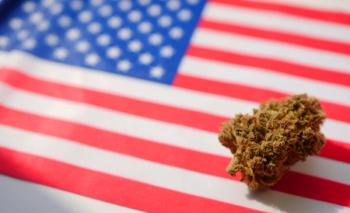
- December 2021
- Volume 2
- Issue 4
Veterans Helping Veterans: Taking Products and Research to the Next Level
Bryan Buckley, the president and CEO of Helmand Valley Growers Company (HVGC), is set to make a big change for the veteran community and is using his company to push research and access forward for his comrades.
Veterans put their lives on the line for our country, but are often met with obstacles upon returning home. Bryan Buckley, the president and CEO of Helmand Valley Growers Company (HVGC), is no stranger to the challenges veterans face as a Marine veteran himself. Along with his cofounders, Buckley is set to make a big change for the veteran community and is using his company to push research and access forward for his comrades.
What is Helmand Valley Growers Company’s (HVGC) mission and objective?
Bryan Buckley: HVGC was conceived from the stresses of battle, to help everyone battling day-to-day life. We’re on a mission to help put an end to the opioid and suicide epidemic plaguing our Nation’s Heroes. We believe that exploring the benefits of medical cannabis is the most effective way to combat these issues and bring proper aid to those who gave so much for our great country.
How do you educate others on the benefits of medical cannabis? Does HVGC take part in educational outreach outside of the organization?
Buckley: We work with various veterans groups, hold Patient Appreciation Days (PADs) at dispensaries, and speak at public events. This has provided us with amazing opportunities to discuss our mission with others while learning from them. We want to know how we can better help serve our veteran community. Upcoming, we have a medical cannabis study to collect the data to see if the plant can reduce the symptoms of post-traumatic stress and we have many veterans who are eager to assist.
How involved is HVGC in the veteran community? How does HVGC support veteran medical cannabis research?
Buckley: We are very active in the veteran community. We are proud members of the Veterans Action Council and we also work with members of the United States Congress. We have also been awarded an Institutional Review Board (IRB) with NiaMedic Healthcare and Research Institute along with the University of California at Irvine Health. We fund our research by donating 100% of our profits from HVGC to our veteran medical cannabis research initiative.
How are HVGC products different from other cannabis products currently on the market?
Buckley: We listen to our veterans and find out what helps them the most to combat the injuries they received, both physical and emotional, during their service. Again, 100% of our profits goes back to fund veteran medical cannabis research. Not only are you getting a great product, you are also going to help support veterans.
How should new consumers and those curious about medical cannabis reach out to your organization when it comes to education and finding the right products or dosing?
Buckley: We cannot give medical advice, but if you want to get into medical cannabis treatment, we would refer you to NiaMedic. However, we can point you in the right direction and provide recommendations from our own experience, by reaching out to us on our Instagram
How do the different state-by-state regulations on medical cannabis affect your work with veterans and the plant?
Buckley: It has not had much of an impact on us. We currently only operate in California, so we just adhere to the state law. In terms of our study, we received a private Institutional Review Board (IRB). As a result, we do not need to work with the federal government. This provides us with a little more flexibility in terms of how we can adjust and adapt to findings in our study.
Can you tell us a little bit about the Battle Brothers Foundation?
Buckley: Battle Brothers Foundation is a 501c3 nonprofit. It operates with a three tier approach of personal, medical, and economic. We work to help veterans transition out of the military, help with VA disability claims, connect veterans who are suffering to treatment centers to help them get back up on their feet, medical cannabis research, job placement, and so forth. We want veterans to have that sense of purpose like they did while serving our country, with the hopes of stopping a veteran from making a mistake they cannot come back from. We customize our program to meet the needs of the individual.
How does the stigma surrounding cannabis affect your work?
Buckley: It has not been as bad as many would think. It seems like each day, people are understanding that cannabis is not the “devil’s lettuce.” It is becoming normalized and the genie has been far removed from the bottle. This movement has a lot of positive momentum.
Are there any regulations that you would like to see pass such as federal legalization?
Buckley: I would love to see cannabis be moved from schedule 1 to a schedule 3. This would destroy tax code 280E and it would open up more research opportunities.
What would you like to see change in the medical cannabis landscape over the next 5 years?
Buckley: I would want to see medical cannabis be offered in the VA medical system, which would make it federally legal. This would not only benefit veterans, but the countless patients in America that could benefit from cannabis. I will never say that cannabis is for everyone, however, it should be a tool in the toolkit.
Would you like to add anything more?
Buckley: If you would like to help support us on this mission, please donate at
Articles in this issue
about 4 years ago
December 2021 Digital Editionabout 4 years ago
What Can We Do for Our Veterans?about 4 years ago
PTSD by the Numbersabout 4 years ago
Overview of the Research on Cannabis for PTSDabout 4 years ago
A Doctor’s Fight for Cannabis Reform and Regulationabout 4 years ago
Cannabis, Women Veterans, and VSOs: An Advocate’s Journeyabout 4 years ago
Americans for Safe Access: Two Veterans Pushing for More Scienceabout 4 years ago
Veterans Farming at CARE WaialuaNewsletter
Unlock the latest breakthroughs in cannabis science—subscribe now to get expert insights, research, and industry updates delivered to your inbox.

